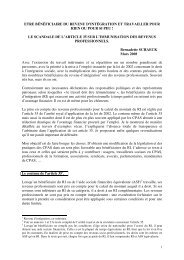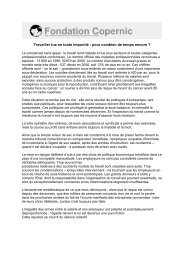Awra Amba RJ 300612 EN - Contacter un comité local d'Attac
Awra Amba RJ 300612 EN - Contacter un comité local d'Attac
Awra Amba RJ 300612 EN - Contacter un comité local d'Attac
Create successful ePaper yourself
Turn your PDF publications into a flip-book with our unique Google optimized e-Paper software.
<strong>Awra</strong> <strong>Amba</strong>, a current experiment of utopian socialism<br />
the jealousy of its neighbours as evidenced by several interviews of neighbours reported by Yi07/66-<br />
70. The neighbours trust nevertheless the inhabitants of <strong>Awra</strong> <strong>Amba</strong>, given the absolute ban of<br />
stealing and lie in their comm<strong>un</strong>ity (At05/66).<br />
Hostility is surely the greatest against Zumra, who is not free to move outside the <strong>Awra</strong> <strong>Amba</strong> site, to<br />
discuss with students of a nearby primary school for instance, because it would create troubles.<br />
Zumra thinks they still have no peace with those people who initiated the conflict between <strong>Awra</strong><br />
<strong>Amba</strong> and other comm<strong>un</strong>ities (Yi07/64). Therefore, he still needs ro<strong>un</strong>d-the-clock protection by an<br />
armed guard when he moves in the village (Me09/80) (see Picture 1 page 19).<br />
Faced with the ostracism and the hostility they are subjected from the conservative surro<strong>un</strong>ding<br />
society, Muslim or Orthodox, the members of the <strong>Awra</strong> <strong>Amba</strong> comm<strong>un</strong>ity remained themselves far<br />
from others. For instance, when they go to the Maksegn market, they don't drink tea at the tearooms<br />
like others (At05/66); the students from <strong>Awra</strong> <strong>Amba</strong> do not play with others and never went to the<br />
Maksegn café like others to drink tea or tela – the <strong>local</strong> beer (Yi07/77 & 83); they did not invite their<br />
neighbours, do not try to convince them and do not visit them (Yi07/71-72); in case of death, they do<br />
not participate in the mourning ceremonies (see section 4.6); finally, they are few open to marriages<br />
with non-members of the village because they require the respect of their rules (Yi07/50-51).<br />
They strengthened their internal solidarity and the respect of their rules (Ya08/138). It is conceivable<br />
that the cohesion and the coherence of the comm<strong>un</strong>ity members allowed them to co<strong>un</strong>ter the hostility<br />
of their neighbours. The awareness to build a new life, a paradise on Earth, leads them to believe<br />
they are different and better than others, probably with some pride as Yi07/72 thinks.<br />
The <strong>Awra</strong> <strong>Amba</strong> comm<strong>un</strong>ity wishes to address disputes through rational discussions, without<br />
conflict, through a non-violent and pacifist attitude. They consider those who do not respect them<br />
and want to fight with them as ignorant people, they have to convince that the differences are the<br />
essence of humanity (Ya08/117). In 2012, <strong>Awra</strong> <strong>Amba</strong> considers that its relations with the<br />
neighbours are now entirely satisfactory and that gossip practically disappeared; for that matter,<br />
children of <strong>Awra</strong> <strong>Amba</strong> and children of neighbours play football together in the evening (Crespo,<br />
2012).<br />
6.2. Relations with authorities and Ethiopians<br />
The <strong>Awra</strong> <strong>Amba</strong> comm<strong>un</strong>ity first came to the nation’s awareness when Zumra Nuru gave an<br />
interview on national television aro<strong>un</strong>d 2006. Since then, numerous camera crews have visited the<br />
village. They are not alone. Government officials, members of parliament, sheikhs and priests from<br />
the whole Amhara region and from elsewhere, and <strong>local</strong> and foreign non-governmental organization<br />
workers have made the trip using the road (not tarred till 2009) to see the success of the comm<strong>un</strong>ity<br />
for themselves (Halpern, 2007). Many school buses arrive every month (Picture 18). In 2009 (or <strong>un</strong>til<br />
2009: see above) the village received six thousand Ethiopian visitors and also a handful of<br />
Westerners. The village has constructed a hostel for visitors, who must first of all describe the<br />
purpose of their visit (Mamo, 2006). Although many visits are quite short (aro<strong>un</strong>d two hours),<br />
welcome takes a lot of time (two full time persons in 2012) according to Crespo (2012).<br />
The comm<strong>un</strong>ity of <strong>Awra</strong> <strong>Amba</strong> planned in January 2011 to equip an existing room for a computer<br />
and Internet access, and to buy a minibus for transporting villagers and visitors from and to Woreta,<br />
which should make the recognition of the comm<strong>un</strong>ity even easier. These projects are not completed<br />
in 2012 (Crespo, 2011; 2012).<br />
Its fo<strong>un</strong>der is also invited to share his experience in different <strong>un</strong>iversities throughout the co<strong>un</strong>try.<br />
Thus he was invited six times in 2009: twice to Addis Ababa and Bahar Dar, once to Awasa and<br />
Mekele. He was also invited to neighbouring Kenya, but was not able to attend through lack of<br />
finance (moreover, speaking only Amharic, he would have had to be accompanied) (Jo10b/10).<br />
72 / 85

















